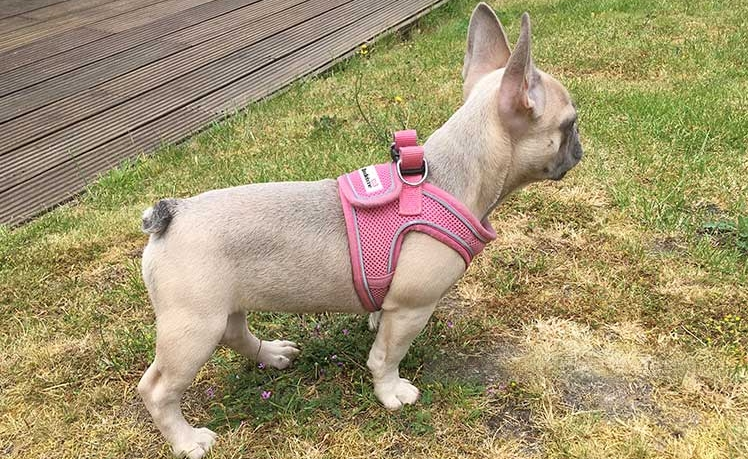Have you noticed your French Bulldog shaking, trembling, or quivering? If so, you’re probably wondering why and what you can do about it. This can be alarming for some owners, but it’s quite normal. There are a few different reasons your Frenchie may be shaking; in most cases, there is no cause for concern.
Shaking can be a sign of a medical condition, a behavior problem, or something else altogether. Before you take action, it’s important to understand the possible causes of your pup’s shaking and the best ways to address the issue. In this article, we’ll discuss why your French Bulldog might be shaking and provide tips on how to help. You should feel more confident about tackling the issue and getting your pup back to feeling his best by the end.
The Main 8 Reasons For French Bulldog Shaking
There are 8 known reasons behind a French Bulldog’s shake. Anxiety or fear is the main cause of shaking.
- Anxiety and Stress: One of the most common reasons for French bulldog shaking is anxiety and stress. French bulldogs are prone to anxiety and stress, especially when separated from their owners or placed in unfamiliar surroundings. This can cause them to shake and shiver to cope with their emotions.
- Cold Weather: Another reason for French bulldog shaking is cold weather. French bulldogs have short and thin coat, which does not provide much insulation against the cold. When exposed to chilly temperatures, they may start to shake as a way of trying to keep warm.
- Pain or Discomfort: French bulldogs may also shake due to pain or discomfort. Various factors, such as injury, arthritis, or digestive issues, can cause this. If your French bulldog is shaking and you suspect it may be in pain, it is important to take them to the vet for an examination.
- Hypoglycemia: Hypoglycemia, or low blood sugar, is another reason for French bulldog shaking. This is particularly common in puppies, as they have a fast metabolism and require frequent feeding. If your French bulldog is shaking and displaying other symptoms, such as lethargy or disorientation, it is important to seek veterinary attention immediately.
- Poisoning: This can be caused by ingesting toxic substances such as pesticides, cleaning products, or medications. If you suspect your French bulldog may have ingested a toxic substance, it is important to seek veterinary attention immediately.
- Old Age: As French bulldogs age, they may experience various health issues, including shaking. Various factors, such as arthritis or neurological conditions, can cause this. If your French bulldog is shaking and displaying other symptoms, such as difficulty walking or standing, it is important to take them to the vet for an examination.
- Allergies: French bulldogs are prone to allergies, which can cause various symptoms, including shaking. Various factors, such as food or environmental allergies, can cause this. If you suspect your French bulldog may suffer from allergies, it is important to take them to the vet for an examination.
- Seizures: Seizures can be caused by various factors, such as epilepsy or brain tumors. If your French bulldog is shaking and displaying other symptoms, such as drooling, loss of consciousness, or muscle twitching, it is important to seek veterinary attention immediately.
What Should You Do If Your French Bulldog is Shaking?
French bulldog shaking has many potential causes but can easily be combated. If the cause is related to cold temperatures, providing the dog with a warm blanket or other warm clothing items may do the trick.
Similarly, if the cause is linked to anxiety or stress, engaging in positive reinforcement – such as introducing new toys, going for walks more frequently or playing more regularly – can help. In extreme cases, however, shaking from French bulldogs could indicate poor health, such as organ failure or neurological disorders; these require veterinary intervention and should not be left untreated.
French Bulldog Anxiety or Fear
Many French bulldog owners experience extreme anxiety and fear when looking after their beloved pups. This is a common response for this breed, as dogs can become easily stressed due to the size of their heads, the shape of their face, and their short muzzles.
As owners, it is important to know indications that breed anxiety or fear – panting, alertness or barking at unfamiliar sounds in the house, cowering from strangers or loud noises. To ensure that our pups feel secure and happy, we must provide plenty of activities based on positive reinforcement, such as walks or playing with chew toys.
Additionally, please take note of dietary changes, exercise schedules and times when Frenchies may become startled by unexpected changes around them. By doing this, we will create an environment that allows your pup to come out of his shell and remain stress-free.
Hypothermia in French Bulldogs
Hypothermia is a real danger for French bulldogs in chilly climates. While these lovable little companions are resilient, their shorter fur often doesn’t provide enough barrier against cold weather. It’s important to be aware of the signs of hypothermia to protect your French bulldog from the elements properly.
Early signs to watch out for include shivering, sluggishness, and weak heart rate, progressing to lethargy, pale gums and other severe symptoms depending on the severity of the hypothermia. If your pup exhibits any of these symptoms, it’s best to take it to the vet immediately to assess further and treat it accordingly.
Conclusion
French bulldogs can shake because of a variety of reasons. With proper care and diet, those shivers will usually go away within no time. If your pup is anxious or scared, it’s best to comfort them and take the necessary steps to try and remove the source of their fear. Similarly, illness is not uncommon in any breed but can be treated with timely veterinary intervention. If you’re still uncertain what could be causing this issue or are unconvinced about their shivering – don’t be shy to book an appointment with a vet so they can properly assess if medical attention is necessary.



